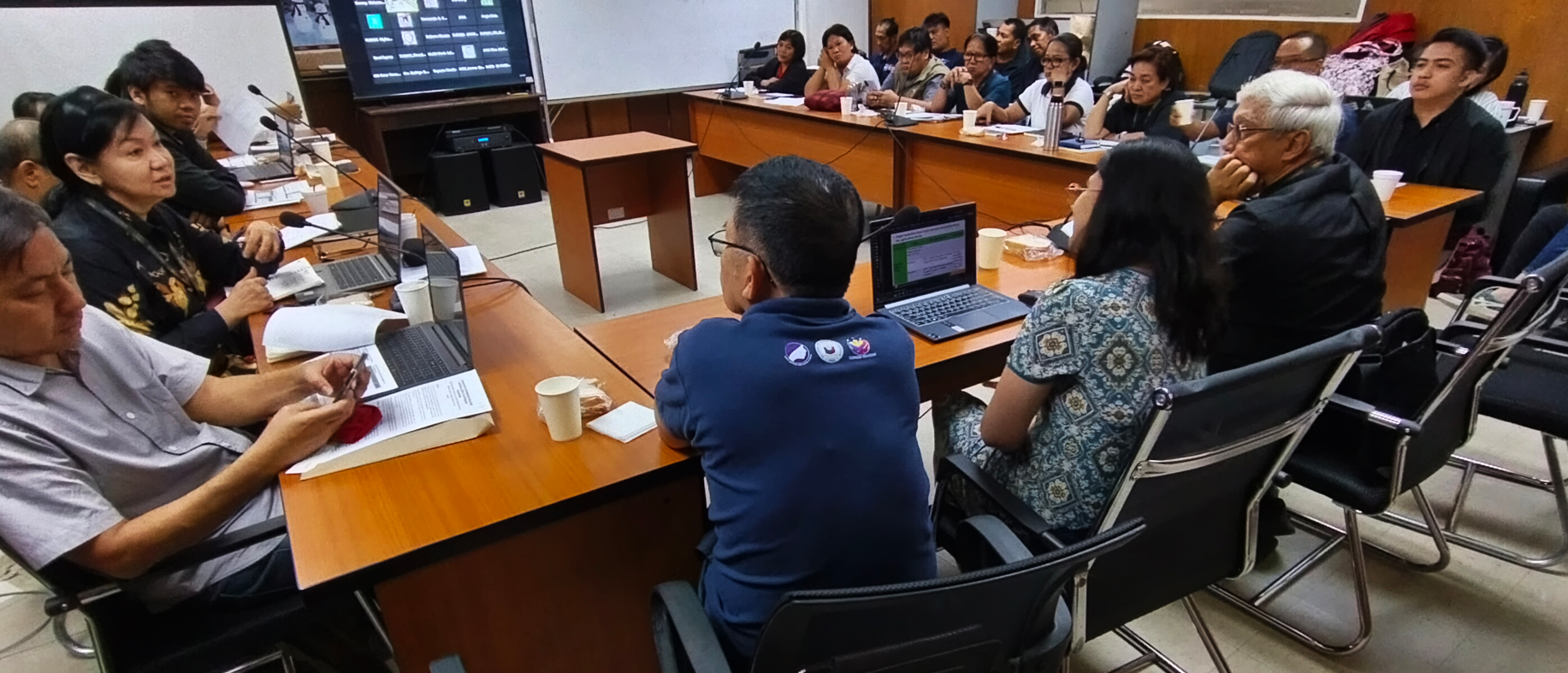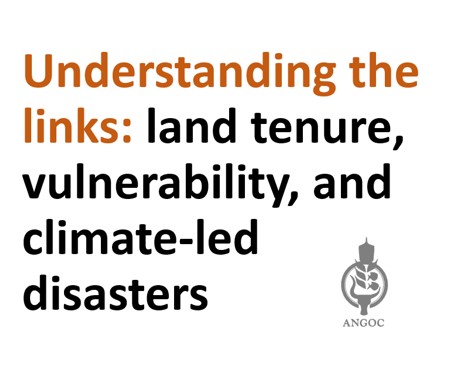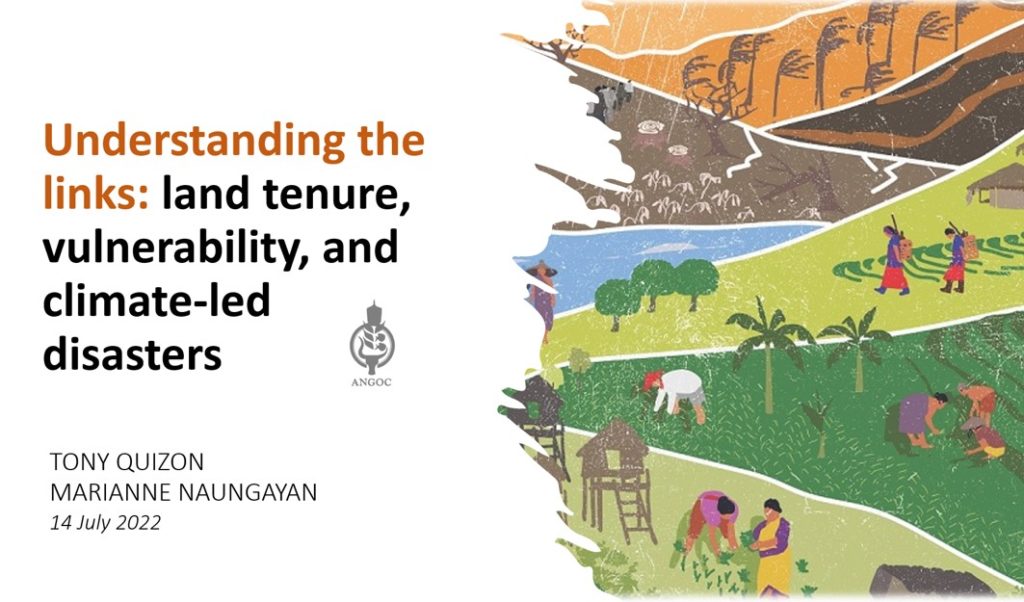



QUEZON CITY, Philippines — Climate change heavily impacts not only the agriculture but tenure of the people as well. Extreme climatic events (such as typhoons, floods, and droughts) can erode or inundate homes and farmlands, render them unproductive, or challenge existing tenure relationships to the disadvantage of vulnerable groups, resulting in forced migration and displacement of populations. Communities may also gradually be detached from their former homes and lands as a result of slow-onset environmental degradation.
As a consequence, those who are poor and have weak or no land tenure rights are among the most vulnerable to the direct effects of climate change.
However, public understanding of the links between climate change, disasters, and land tenure is still very limited. The poor people are often left out of climate change discussions; among the poor, those without land or near landless are the most marginalized and voiceless, and thus, land tenure issues are rarely addressed or tackled.
It is in this context that the Asian NGO Coalition for Agrarian Reform and Rural Development (ANGOC) has recently prepared and published “No Time to Waste: Climate action through secure land rights and sustainable land use” seeking to train the spotlight on specific issues of land tenure, land use and climate change, and on how these are intertwined, thus highlighting the need to address land tenure issues in early efforts at building resilience and disaster preparedness. Discussions within the study were illustrated through seven case studies written by Land Watch Asia CSO partners from Bangladesh, Cambodia, India, Indonesia, Kyrgyzstan, Nepal, and the Philippines.
Highlights of this publication were shared in a webinar jointly organized by ANGOC and the Global Forum for Agricultural Research and Innovation (GFAR) on 14 July 2022, entitled, “Understanding the links of land tenure, vulnerability, and climate-led disasters.” Some 20 participants from at least eight Asian countries participated in the online event.
This learning event is also part of the ongoing initiative of ANGOC and the Global Land Tool Network (GLTN) “Consolidating the Application of Innovative Land Tools for Promoting the Land Rights of Smallholder Farmers in the Philippines” to contribute in transformative and effective land and resource policies and programs towards enhanced access to, control over, and ownership of land and resources by rural communities.
Possible follow-up actions in support of the recommendations outlined in the study was also discussed and explored.
In his presentation, Tony Quizon of ANGOC highlighted that the lack of land rights and tenure security increases the vulnerability of the rural poor, and reduces their capacity to cope with the changes brought about by climate change. Among the main findings presented was also the need to address land tenure issues in early efforts at building resilience and disaster preparedness. Climate change adaptation needs to be mainstreamed into national planning and policy frameworks, including land policy.
Drawn from various CSO field experiences and secondary sources, the paper and case studies presented in simple narratives, in an attempt to further “humanize” the discourse of climate change, with a land rights perspective. The study also raised the following main recommendations:
Datu[1] Minio, an indigenous farmer and chieftain in Mt. Kalatungan, municipality of Pangantucan, province of Bukidnon, Northern Mindanao, Philippines, provided a reflection on the relevance of the study particularly the importance of land rights in increasing the resiliency of farmers amidst the impact of climate change. Their case demonstrates how land rights can withstand the threats of disaster and protect the landscape from landslides, erosion, and flooding; and how it provides huge opportunity for food security and sustainable source of livelihood. Their Indigenous Knowledge Systems and Practices (IKSPs) in planting trees within their ancestral domain have also opened up opportunities for many stakeholders to help, support, and sustain efforts in protecting and conserving the environment.

Datu Herminio Guinto, an indigenous chieftain, delivering his reflection on the importance of land rights and tenure security in increasing the resiliency of farmers amidst the impact of climate change
The Global Land Tool Network (GLTN) appreciated the work of ANGOC and partners, as the study and cases built upon and further strengthened the relationship between land governance and climate change adaptation, including on land rights and land use. Thus, recognizing land rights of the poor and vulnerable is critically important in climate change mitigation and adaptation. Consequently, land rights should be integrated in any climate change adaptation plan or policy.
During the breakout discussion, participants have further tackled the strategies on how to raise awareness of the human impact of climate change and how to give voice to those who are most affected (i.e., the landless). Among the approaches/actions suggested include the documentation of community-level evidence on the linkages of tenure and climate change and making them publicly available, pursuing natural farming, supporting community-based conservation efforts, and protecting community land rights to increase their resilience and capacity to adapt to climate change. As such, these ideas will further be developed into potential joint action by ANGOC and GFAR.
Materials and references used in the webinar:
[1] A title for chiefs, sovereign princes, and monarchs in the Visayas and Mindanao regions of the Philippines
